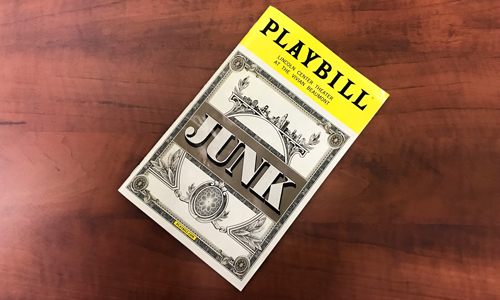Business has had a major influence on American culture, with movies like “The Wolf of Wall Street” portraying traders and CEOs as near-mythological figures. In “Junk: The Golden Age of Debt,” which officially opens tonight in New York City, Pulitzer Prize winning playwright Ayad Akhtar deconstructs the country’s obsession with the world of deals and acquisitions and looks at the tragedy that so often accompanies greed and cutthroat competition.
Act One is set in 1985, during the rise of junk-bond financing that changed the financial system. Business journalist Judy Chen is writing a book on investment banker Robert Merkin, who uses debt to overtake companies, eventually setting his sights on the iconic names of American manufacturing.
The Los Angeles Times describes it as “Part Shakespearean history play, part ‘The Big Short.’ “
As theater, “Junk” is an entertaining and enlightening success. But its focus on business journalism is also a reminder of how the business press has failed over the years. Here are a few (spoiler-free) takeaways that are important for both new and experienced business journalists to keep in mind whether covering Wall Street or Main Street.
1. Don’t get lost in the numbers
The play’s set design is stunning: a simple black floor and split backdrop lined with lights that flash and fall to fast-paced music, a lot like the gameshow “Who Wants to be a Millionaire?” While the actors are busy making deals, numbers run across the set as on a stock ticker. Numbers—particularly huge sums of money—are crucial to the play, as its businessmen and women are seduced by deals that get bigger and bigger.
This is true for the one character who shouldn’t get dizzy when the dealmakers are shouting out ever-increasing dollar amounts: business journalist Judy Chen.
While numbers are often at the heart of business coverage, being unintimidated by big figures is important for a business journalist. You’ll come across large deals and finances everywhere, even when covering mom-and-pop businesses at a small-town weekly. It’s your job to look beyond the dollar signs and ask questions that put them in context. Why are they significant? How did these figures evolve? How do they compare to similar examples locally and across the country?
Whether its the city budget or a local store being bought out by a national company, your readers don’t need to know how impressive the numbers are. They need to know what the numbers mean for them and their community.
2. Business stories are people stories
When “Junk” opens, its central figure, the investment banker Robert Merkin, is on the cover of Time magazine. The headline proclaims, “America’s Alchemist. Debt Becomes an Asset.” While there are plenty of Merkin skeptics, his ability to preach the new finance revolution wins numerous followers. It’s a characteristic shared by many of the business owners and financiers in the play. In fact, the play starts with Chen proclaiming that this is the new age of kings clad in Brooks Brothers suits.
The business world is filled with inspirational stories at every level, from classic Horatio Alger tales to gritty business owners set on success. Just as you can’t let the numbers become larger than life, you can’t let your subjects either.
It’s great to tell stories of success, but it’s even more important to tell your audience how this could affect them. A company might be finding success with a new innovation, but at what cost? Is it exploiting workers? Impacting the environment? Skirting regulations meant to protect consumers?
Every business story about an innovative company or person needs to be grounded in human reality. National reporters can sometimes get so lost in an never-ending search for the next tech unicorn that they miss important stories that affect their audience. Even in a small town, successful business can take on this mythological status.
Just because a person or a company is successful doesn’t mean they’re doing something wrong, but their success likely means something to the larger community. Remember to tell that story.
3. Keep your distance
It’s an obvious rule in journalism, but one that is too often broken: Don’t get too close to your sources. By the end of “Junk,” Chen has embarked upon a romantic relationship with one of Merkin’s rivals. Her objectivity is bound to be compromised.
Conflicts of interest come up frequently in journalism, and they’re not always romantic relationships.
As a local business reporter, you will root for many of the companies you cover. You want your community to thrive and that means you want the businesses you cover to thrive as well. That doesn’t mean you look the other way when someone is breaking a law or is unethical.
These three points are obvious to most journalists. But as Akhtar explores in “Junk,” the most basic human shortcomings often have the most serious aftermaths.










